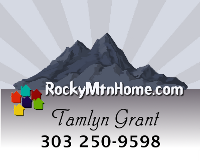What You Need to Know About Home owner’s Insurance. Also commonly called “Hazard Insurance” or “Property Insurance”.
Home owner’s insurance is part of the PITI. PITI is an acronym for principal, interest, taxes, and insurance, the four components of a mortgage payment.
In Colorado, there is a provision in the contract to purchase property which gives the buyer the chance to review property insurance on the property they are buying. Basically this provision allows the buyer the option of terminating the contract after getting several property insurance quotes. If the buyer finds that the Insurability of property is unsatisfactory to them because of terms or conditions of the policy or availability of insurance, the buyer can terminate the contract to buy and get their earnest money back.
Odds are a new home is going to be one of the largest purchase you ever make. So you definitely want to make sure that your investment is protected in the case of a disaster. Most lenders require home owner’s insurance to secure a mortgage, so you will want to check with your lender to see what amount of coverage is required.
It takes additional work to sort through the details of a home insurance policy, but a little time invested now can pay off a great deal later. Here are some tips on figuring out how to get a home insurance policy that meets your needs.
A typical home owner’s insurance policy will provide coverage in the following 4 areas. How much coverage in each of these areas is a discussion you need to have with your insurance agent:
- Against damage to the structure of the home itself.
- Against damage to personal property within the home.
- Against liability claims made by someone in the home.
- To pay for expenses incurred while you were unable to live in the home.
Damage basics
The types of disaster covered vary. The list of damage and disasters commonly covered by hazard insurance is surprisingly long: physical damage to your property and its contents caused by fire and smoke, wind, hail, lightning, explosions, volcanoes, riots and vandalism, theft, water damage (excluding Flood damage), and similar events.
Nevertheless, that list doesn’t cover everything that could happen. Check the boilerplate section of your policy called “exclusions.” Flooding and earthquakes are commonly excluded from coverage — even though many home owners assume otherwise. It’s also typical for policies to exclude damage caused by mudslides, police activity, power outages, sewer backups, dry rot, or vermin, among other things.
Some Other Disasters that require Additional Coverage:
FLOOD INSURANCE
Standard homeowners insurance doesn’t cover flooding, it’s important to have protection from the floods associated with hurricanes, tropical storms, rising rivers and streams overflowing their banks, and heavy rains. Depending on where you are the home you are buying is located, flood insurance may be requirement for obtaining a mortgage. You can get flood insurance through the National Flood Insurance Program (NFIP), which is run by the federal government. The Denver Metro Area has several “High-Risk” flood zones. You can check to see if the home your a interested in is in a “flood zone” by going to www.floodsmart.gov and entering the address in their form.
EARTHQUAKES
Earthquakes are also generally not included in a standard policy. Californians buying houses can purchase earthquake insurance through the California Earthquake Authority; non-Californians may still look into earthquake insurance. Fortunately, Colorado has a very low occurrence of earthquakes or tremors that cause damage.
Review What you’re getting
You want to make sure you’re insuring against the cost to rebuild, not the market value of the home. An older, less expensive home will cost considerably more to rebuild than to resell. The Rocky Mountain Insurance Information Association gives this quick rule of thumb: multiply the local building costs per square foot by the total square footage of your house. Also see if your insurer has an “inflation guard” clause that will automatically increase your coverage if the costs of construction rise.
As with the home itself, it may make more sense to insure against the replacement cost of items in the home rather than the actual value of the item.
Making property claims on home owners’ insurance can lead to increases in the cost of your policy.
Other insurance needs
If you run a small business from your home, you’ll need separate insurance; Yet another category that requires separate consideration are domestic workers in your home — cleaning services, nannies, caretakers. If you know you’ll have people coming to work in your home, discuss this with your insurance agent. Liability coverage generally covers any injuries people in your home might have, but with workers in your home you might want to increase the coverage substantially. (Look at it this way: if someone working in your home is injured, you’ll bear some responsibility for their medical bills.)
Review your coverage
Once you get home owner’s insurance, your work isn’t done: you’ll want to review your coverage every year, especially if you make changes to your home or buy new items that might not be covered.
